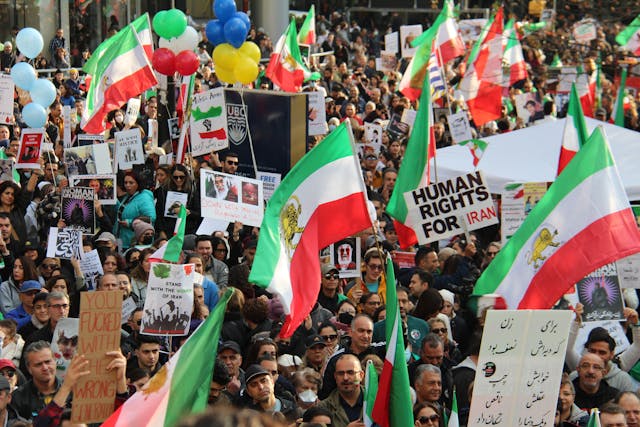by Ilaria Lorusso (Iran Team) in collaboration with the Human Rights Team
Introduction
Iranian elections following former president Raisi’s death in May 2024 were called rather abruptly for this July and resulted in the appointment of Massoud Pezeshkian. Considered a moderate candidate, he campaigned for his election maintaining progressive stances both in internal and external politics, promising more liberties and equal rights – especially with regards to women’s issues, animating the Women, Life, Freedom movement – on one hand, and advocating for a renewed nuclear deal and relations with Western countries, particularly the US, aimed at relieving the sanctions that have weakened the Islamic Republic to this day. His political positions fuel refurbished hope for social justice in Iran. However, the fact that he does not seem to want to openly disrupt the system in place after 1979 revolution, and the persistence of a conservative parliament and the absolute authority of Supreme Leader Khamenei dilute the expectations of most human rights advocates vis-à-vis the efforts possible to mitigate the oppression of traditionally marginalised groups. The LGBTQ+ community is notoriously part of the latter. Even if the new president has not exposed himself explicitly on this topic yet, this piece aims at retracing the treatment of LGBTQ+ rights in Iran, making evident above all the risks queer citizens undergo in the country in the current status quo.
Sharia and LGBTIQ+ rights
As an Islamic Republic after the 1979 revolution, Iran abides by the Shari'a system, following a strict interpretation of Islamic religious texts as a base for law norms1. As such, already when it comes to heterosexual relationships, the 2013 Iranian Penal Code2 condemns any form of sexual activity outside of a lawful marriage. Any extra-marital sexual relations, identified as zina, are illegal and subject to criminal sanctions.
Zooming in, homosexuality – particularly among men – is forbidden (haram) and considered a moral, physical, and psychological disorder, comparable to the heterosexual zina. Article 234-239 of the Penal Code shows that the death penalty is imposed on citizens accused of homosexual acts, particularly for those performing a “passive” role in the relationship. This, combined with the relative indulgence with which homosexuality between women is treated, reveals particularly the will to preserve a certain type of masculinity that Iranian men are supposed to perform3. Lashing, prison and fines are the alternative and almost always applied punishments associated with acts that fall into the interpretation of “sexual deviancy” – lesbian relationships and cross-dressing being among these. Besides legislation, then, the LGBTQ+ community is subject to state violence and police prosecution, with reported mass arrests and torture under custody, and queer activists imprisoned for threatening national security and production of “immoral content”.
LGBTQ+ community and the Iranian society
More importantly, because homotransphobia is widespread in Iranian society – up to 90% according to Equaldex’s 2022 findings4, discrimination then extends in every aspect of one’s personal and professional life, with limited access to housing, education, employment, judicial system and healthcare. Interestingly, The Islamic Republic of Iran offers limited subsidised support for gender confirmation surgery, hormone replacement therapy, and psychosocial counselling for trans people. This is due to the fact that the latter views are seen through the lens of gender identity disorders. This medicalisation has provided some legal recognition for trans individuals but has also reinforced the stigma that they suffer from psychological and sexual disorders and need treatment to become "normal"5. In a way, gender reaffirmation therapy is also perceived as a way to “correct” deviances related to non-heterosexual sexual orientations. Accordingly, trans individuals in Iran, whether recognised by the state, seeking recognition, or living without it, frequently face discrimination and abuse due to their gender identity, including hostile public attitudes, extreme violence, and the risk of arrest, detention, and prosecution.

Queer activism, Mahsa Amini’s protests and the way forward
The 2022 national unrest related to the death of Mahsa Amini re-fueled not only women’s rights activists but also those belonging to the queer community. in custody for allegedly wearing her hijab improperly sparked nationwide protests in Iran, met with deadly force by the government. During the protests, young LGBTQ citizens openly defied the regime by removing their hijabs and displaying same-sex affection publicly6. Activists have also used pro-LGBTQ slogans and symbols, increasing visibility but also facing backlash, as the later overturned death sentence to queer activist Sareh Sedighi-Hamadani in that period exemplifies7. Clearly, this shows that queer liberation is to this day a pressing issue in Iranian civil society, and links back to the general discontent that especially younger generation has towards the post-revolution religious élite. Whether the new presidency will be able to appropriately take up the demands of these movements, remains an open question.
- Rehman, J., & Polymenopoulou, E. (2013). Is green part of the rainbow: sharia, homosexuality, and LGBT rights in the Muslim world. Fordham International Law Journal, 37(1), 1-52. ↩︎
- Center for Human Rights in Iran (2021, August). Fact Sheet: LGBTQ rights in Iran. https://iranhumanrights.org/wp-content/uploads/LGBTQ-Iran-Fact-Sheet.pdf ↩︎
- Karimi, A., & Bayatrizi, Z. (2019). Dangerous positions: Male homosexuality in the new penal code of Iran. Punishment & Society, 21(4), 417-434. https://doi.org/10.1177/1462474518787465 ↩︎
- https://www.equaldex.com/region/iran ↩︎
- OutRight Action International (2016). Human Rights Report: Being Transgender in Iran. https://outrightinternational.org/our-work/human-rights-research/human-rights-report-being-transgender-iran ↩︎
- Iran protests: LGBTQ community rises up (2023). BBC Website, April 19th. https://www.bbc.com/news/world-middle-east-64864132 ↩︎
- Good news: Sareh Sedighi-Hamadani’s death sentence overturned (2023). Amnesty International Australia Website, May 16th.
https://www.amnesty.org.au/good-news-sareh-sedighi-hamadanis-death-sentence-overturned/ ↩︎
No comments.